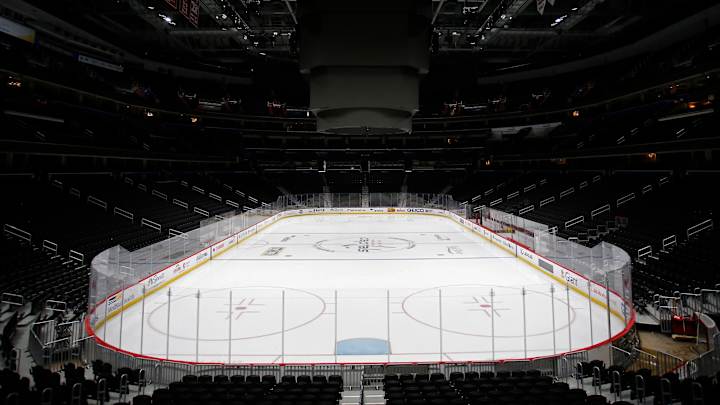NHL Season Suspension Echoes of 1919 Stanley Cup Cancellation

One hundred and one years ago, the hockey world came to a crossroads. As five members of the Montreal Canadiens—and manager George Kennedy—lay bedridden with influenza at a downtown Seattle hotel on April 1, 1919, nursing fevers that ranged from 101 to 105 degrees Fahrenheit, an unprecedented decision was made: The Stanley Cup final, scheduled to conclude that night with a winner-take-all tilt between the Habs of the National Hockey League and the Seattle Metropolitans of the Pacific Coast Hockey Association, would be canceled.
“This has been the most peculiar series in the history of the sport,” PCHA president Frank Patrick told reporters later, via the Montreal Gazette. “Precedent after precedent had been broken. There never was another series of games like the present one.”
Imagine what Patrick would make of the situation unfolding across the globe today. Following the lead of the NBA, MLS, and numerous other international leagues—not to mention a few hours ahead of the NCAA—commissioner Gary Bettman announced the temporary postponement of the 2019-20 NHL season due to the novel coronavirus, COVID-19. The league's statement specifically cited Wednesday night’s confirmed diagnosis of Utah Jazz center Rudy Gobert as motivation.
“The NHL has been attempting to follow the mandates of health experts and local authorities, while preparing for any possible developments without taking premature or unnecessary measures,” Bettman wrote in a statement. “However, following last night’s news that an NBA player has tested positive for coronavirus – and given that our leagues share so many facilities and locker rooms and it now seems likely that some member of the NHL community would test positive at some point – it is no longer appropriate to try to continue to play games at this time.”
The decision felt like a long time coming, though perhaps that’s because a decade’s worth of anxiety has been stuffed into the past week thanks to the pandemic, which has infected nearly 1,000 patients and killed almost 30 in the United States alone. On Friday morning, NHL teams were advised to cancel morning skates, practices and team meetings while awaiting the results of a 1 p.m. Board of Governors conference call. At 1:40 p.m., Bettman’s statement hit inboxes.
“The decision to temporarily suspend play due to the COVID-19 pandemic is an appropriate course of action at this time,” an NHLPA statement said. “The NHLPA will continue to closely monitor this very dynamic situation and remain in daily discussions with the league, our medical consultants, and our players regarding all aspects of this matter. The players are looking forward to the opportunity to resume play in front of hockey fans everywhere.”
In an alternate universe absent the virus, four weeks are remaining until the postseason. The defending-champion Blues are leading the Western Conference, poised for a repeat run, and the Bruins are perched atop the East after falling to St. Louis in Game 7 last spring. Edmonton’s Leon Draisaitl is running away with the scoring race. Alex Ovechkin is gunning for another 50-goal season, and four Canadian clubs are clutching playoff spots. What thrills!
Instead, the league is entering uncharted territory. Teams that had been traveling on the road were ordered to return home. Players were directed to avoid traveling, practicing or otherwise meeting in groups, per Sportsnet. Plenty of minor issues need to be hashed out throughout the hiatus, no matter how long it lasts. How will the schedule look when games resume? When will playoffs take place, and how late is too late? What about the financial implications of shutting down business? For now, though, the directive for players, staffers and fans alike is clear:
“We will continue to monitor all the appropriate medical advice, and we will encourage our players and other members of the NHL community to take all reasonable precautions – including by self-quarantine, where appropriate,” Bettman said. “Our goal is to resume play as soon as it is appropriate and prudent, so that we will be able to complete the season and award the Stanley Cup. Until then, we thank NHL fans for your patience and hope you stay healthy.”
Only once in NHL history has a season been cut short without completion. That was back in 1918-1919, when influenza affected one-quarter of the world population. As Kennedy and his players recovered, a tie was declared between the Metropolitans and Canadiens, gate receipts were distributed 50-50—instead of the proposed 60-40 split favoring the winning team—and Lord Stanley’s trophy remained in Toronto, winners of the previous year’s installment.
But these are different times. The virus continues to spread at a rapid rate, surpassing 125,000 global cases on Thursday. In the United States, COVID-19 testing kits remain limited and expensive (though the Jazz managed to obtain 58 of them in a pinch, revealing another positive case in superstar guard Donovan Mitchell). Schools are closing, stores are shuttering and stock markets are suffering. With hockey only a small part of this pandemic puzzle, what is there left to do?” As one NHLPA team representative texted SI in the wake of the postponed season:
“It’s all a wait and see right now.”
